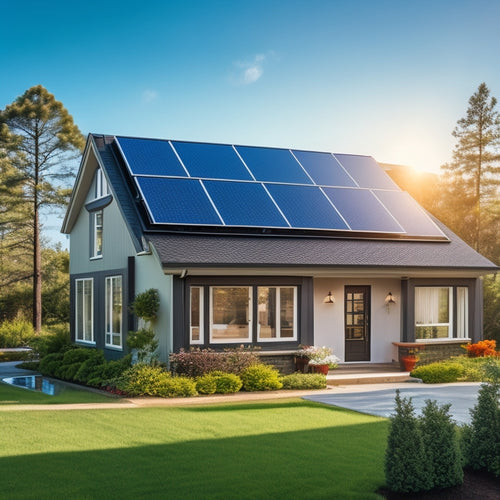
What's the Average Cost of Solar Panels and Battery Systems
Share
You can expect to pay between $15,000 and $30,000 for a solar panel and battery system, with the average cost per watt ranging from $2.50 to $3.50. Solar panels account for about 60% of the total cost, while inverters and mounting hardware represent around 20% and 10%, respectively. Installation costs, including labor and permits, make up 5% to 10%. Battery storage systems add an additional 5% to 15% to the total cost. Factors like battery type, quality, and capacity, as well as state and utility incentives, can impact your overall investment. As you investigate your options, you'll uncover more intricacies that can help you make an informed decision.
Key Takeaways
- The average cost of solar panels ranges from $2.50 to $3.50 per watt, with a standard residential system costing $15,000 to $20,000.
- Battery system costs vary by type, with Lead-Acid costing $150-$300 per kWh, Lithium-Ion $400-$600 per kWh, and Sodium-Ion $200-$400 per kWh.
- Total system cost averages between $15,000 and $30,000, with solar panels accounting for approximately 60% of total costs.
- Installation costs, including labor and permits, make up 5% to 10% of total costs, while battery storage systems add an additional 5% to 15%.
- Federal and state incentives, such as the solar investment tax credit, can significantly reduce upfront costs, making solar energy more affordable.
Average Cost of Solar Panels
Breaking down the cost of a solar panel system, let's examine the average cost of solar panels themselves. The average cost of solar panels ranges from $2.50 to $3.50 per watt, depending on the efficiency and quality of the panels. For a standard residential solar panel system, you can expect to pay around $15,000 to $20,000.
However, with financing options like solar loans and power purchase agreements, going solar becomes more accessible.
Solar panel efficiency plays a crucial role in determining the overall cost. Higher-efficiency panels may cost more upfront but provide more energy per hour of sunlight. For instance, a 300-watt panel with 20% efficiency will produce more energy than a 250-watt panel with 15% efficiency.
When selecting solar panels, consider the balance between upfront cost and long-term energy production.
As you examine financing options, keep in mind that many states and utilities offer incentives for going solar. These incentives can greatly reduce the upfront cost, making solar energy more affordable.
Battery System Pricing Factors
Since you're contemplating an extensive solar panel system, you'll also want to factor in the cost of a battery system, which allows you to store excess energy generated during the day for later use. This is especially important if you want to ascertain a steady power supply during grid outages or at night.
When it comes to battery system pricing factors, you should take into account the type and quality of the batteries, as well as their capacity. The more energy you want to store, the larger the battery capacity needs to be, which increases the cost.
Battery efficiency also plays a significant role, as more efficient batteries can store more energy per unit of capacity. Additionally, installation incentives, such as federal and state tax credits, can help reduce the upfront cost of a battery system.
Other factors to keep in mind include the brand, warranty, and maintenance requirements of the batteries. Some batteries may require more frequent replacements or have higher maintenance costs, which can add to their overall cost.
Solar Panel Installation Costs
You'll need to contemplate the cost of installing your solar panel system, which can vary considerably depending on several factors. The installation process involves several stages, including site assessment, system design, and permits, which add to the overall cost.
On average, the installation cost ranges from $2.50 to $3.50 per watt, with the total cost varying depending on the system size. For instance, a 5-kilowatt system would cost between $12,500 and $17,500.
Fortunately, you can take advantage of solar panel incentives, such as the federal solar investment tax credit (ITC), which allows you to claim 26% of the total cost as a tax credit. Additionally, state and local governments offer rebates and incentives that can further reduce the installation cost.
It's crucial to investigate and assess these incentives to maximize your savings. By understanding the installation process and available incentives, you can make an informed decision about investing in a solar panel system that suits your needs and budget.
Battery Storage System Costs
As you deliberate on integrating a solar panel system into your energy infrastructure, taking into account the cost of battery storage is vital, given its significant role in optimizing energy independence and resilience. The cost of a battery storage system varies depending on several factors, including the type and size of the battery, the depth of discharge (DOD), and the battery management system (BMS).
| Battery Type | Cost per kWh | Battery Lifespan |
|---|---|---|
| Lead-Acid | $150-$300 | 5-7 years |
| Lithium-Ion | $400-$600 | 10-15 years |
| Sodium-Ion | $200-$400 | 8-12 years |
When choosing a battery storage system, it's vital to evaluate the energy efficiency and battery lifespan. A higher energy efficiency rating means more of the stored energy is available for use, reducing waste and increasing the overall effectiveness of your solar panel system. A longer battery lifespan reduces the need for frequent replacements, resulting in lower costs over the system's lifetime. By selecting a suitable battery storage system, you can guarantee a reliable and efficient energy supply, even during periods of low sunlight or grid outages.
Total System Cost Breakdown
Now that you've selected a suitable battery storage system, it's time to examine the total cost breakdown of your solar panel system. This detailed breakdown includes the costs of solar panels, inverters, mounting hardware, installation, and the battery storage system.
On average, the total system cost ranges from $15,000 to $30,000, depending on the system size and quality of components.
The largest portion of the total cost, around 60%, goes towards the solar panels themselves. Inverters and mounting hardware account for approximately 20% and 10% of the total cost, respectively. Installation costs, including labor and permitting, make up around 5% to 10% of the total cost.
Finally, the battery storage system adds an additional 5% to 15% to the total cost.
Fortunately, incentives and benefits can help offset these costs. The Solar Investment Tax Credit (ITC), for example, provides a 26% tax credit on the total system cost.
Additionally, many states and utilities offer rebates and financing options to help make solar energy more accessible. By taking advantage of these incentives, you can considerably reduce the upfront cost of your solar panel system and start enjoying the long-term benefits of renewable energy.
Frequently Asked Questions
Can I Install Solar Panels on a Rented Property?
You can install solar panels on a rented property if you negotiate a solar panel agreement with your landlord, ensuring you understand renter rights and responsibilities, but be prepared for potential obstacles and compromises.
How Long Does a Typical Solar Panel Warranty Last?
As you commence on your solar expedition, you'll find that a typical solar panel warranty lasts around 25-30 years, mirroring the expected solar panel lifespan, with warranty coverage varying by manufacturer, but often including 10-15 years of workmanship guarantees.
Are There Any Federal Tax Credits for Solar Batteries?
You're eligible for a 26% federal tax credit on your solar battery system, amplifying its benefits, such as increased energy independence and reduced grid reliance, as long as you meet tax credit eligibility requirements.
Can I Use Solar Panels to Charge My Electric Vehicle?
You're likely to join the 80% of EV owners who also own a solar panel system! Yes, you can use solar panels to charge your electric vehicle through solar charging, reducing your carbon footprint and saving money on fuel costs.
Do Solar Panels Work During a Power Outage?
You'll be glad to know that your solar panels won't function during a power outage unless you have a battery storage system, which allows you to store excess energy for later use, ensuring a reliable power outage solution.
Conclusion
As you utilize the power of the sun, the financial burden lifts, like a sunrise dispelling darkness. The average cost of solar panels and battery systems reveals a guiding light of hope for a sustainable future. With installation costs ranging from $15,000 to $30,000, and battery storage systems adding $8,000 to $15,000, the total system cost breakdown shows a significant investment. Yet, as the sun shines bright, so does the prospect of long-term energy independence and savings, illuminating a path towards a greener tomorrow.
Related Posts
-

Step-by-Step Guide to Converting Your Vehicle to EV
You'll begin by evaluating your vehicle's conversion potential, analyzing its weight, aerodynamics, and powertrain co...
-

What Role Do Unicycles Play in Urban Transport?
As you navigate through congested city streets, unicycles emerge as a viable solution, slashing carbon emissions by u...
-

Solar Power Units Perfect for Homes
You're considering installing a solar power unit in your home, a decision that can notably reduce your reliance on tr...


